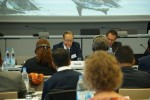CMS Standing Committee Paves Way for New Compliance Mechanism

© Aydin Bahramlouian
Bonn, 31 October 2018 - At its 48th Session, held 23-24 October, at the UN Premises in Bonn, Germany, the CMS Standing Committee, meeting for the first time in the 2018-2020 triennium took on the legacy of the Twelfth Conference of the Parties (COP12), paving the way for an important period for the Convention.
The launch of the CMS Review Mechanism as well as the National Legislation Programme were highlights of the meeting.
“The 48th Standing Committee meeting was a real game changer for the Convention as it laid the foundation for a new compliance regime that will support Parties in delivering their obligations under the Convention,” said Bradnee Chambers, Executive Secretary of CMS.
The Review Mechanism was agreed by CMS Parties in November 2017 at CMS COP12 in Manila and is designed to support Parties that may be facing difficulties in meeting their commitments under the Convention. It sets the procedures which will allow for the submission of a review process as well as the measures and steps that may be taken if a Party is not fulfilling its obligations, such as failing to prohibit the taking of certain migratory species.

In agreeing on the template for submitting cases to be considered under the CMS Review Mechanism, the Standing Committee approved the operationalization of the instrument. The related National Legislation Programme is also entering its operational phase through the finalization and adoption of a questionnaire on national legislation. The programme will take stock of the current status of countries’ legislative frameworks in relation to wildlife law and regulations.
“The review of national legislation is an important step which will allow us to better identify where assistance is needed. Having appropriate laws and regulations in place at the national level is crucial for meeting the commitments of Parties in conserving endangered migratory species,” said Bradnee Chambers.
Reacting to the endorsement of the two new legislative initiatives, the Chair of the CMS Standing Committee, Øystein Størkersen said:
“These two new processes are both necessary and crucial for taking CMS forward by identifying Parties in need of assistance”.
Another highlight of the meeting included the adoption of action plans for the White-headed Duck, Dalmatian Pelican and Turtle Dove.

Another key outcome of the meeting was the adoption of a new format for CMS National Reports. The Committee acknowledged the new format as a significant step forward in terms of simplicity and clarity of the national reporting process. The new format will also provide critical input to the review mechanism and the assessment of progress towards the achievement of the targets contained in the Strategic Plan for Migratory Species (SPMS).
The meeting also saw presentations from the Secretariat on the significant progress made towards the implementation of the Programme of Work for the triennium 2018 – 2020. Given the limited time available during the official session of the Standing Committee meeting, for the first time, the Secretariat organized a series of “brown bag lunch sessions” dedicated to promote some of the key initiatives under the Convention and engage Parties and stakeholders in addressing potential challenges and discussing future plans. These sessions comprised presentations under the themes of “connectivity” and “sustainable – and unsustainable – use” which covered a wide range of topics ranging from biodiversity beyond national jurisdiction, migration atlases, transboundary conservation and insect migration to aquatic wild meat and bycatch of seabirds and turtles. The sessions garnered participants’ support and will therefore will be repeated in the sidelines of future meetings of CMS subsidiary bodies.
This meeting also set the scene for the preparations for the next CMS Conference of the Parties (COP13) which will take place in India in 2020, and for the Convemtion’s contributions to the development of the post-2020 Global Biodiversity Framework for which a special inter-sessional working group was established and met in Bonn on 25 October.
On the final day of the meeting, Mr Soumitra Dasgupta, the representative of India, the Host Government for COP13, gave an update on the status of preparations for the Conference, which will be held in Gandhinagar, the capital of Gujarat in February 2020. In the closing moments of the meeting, the Secretariat honoured two long-serving staff members who will be retiring soon – Borja Heredia, Head of the Avian Team, and Patricia Nolan-Moss, the Personal Assistant to the Executive Secretary and thanked them for their dedicated service.
Last updated on 12 December 2018








